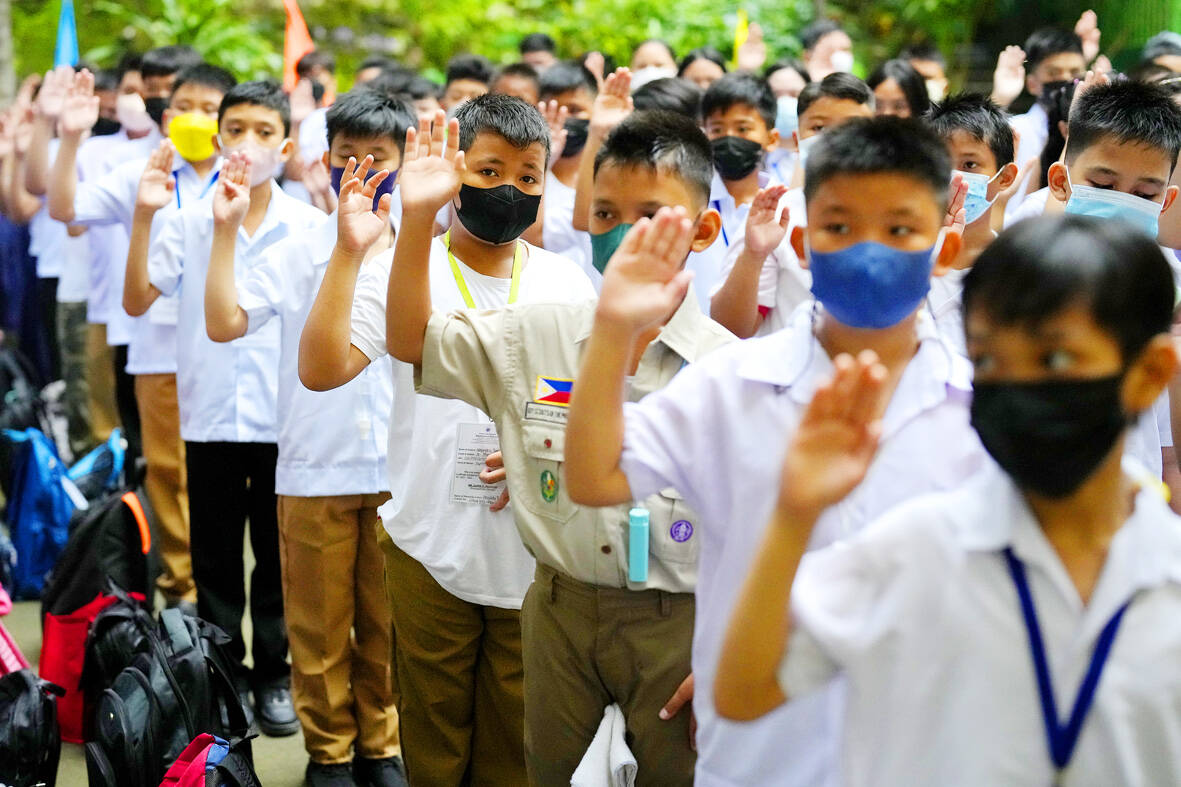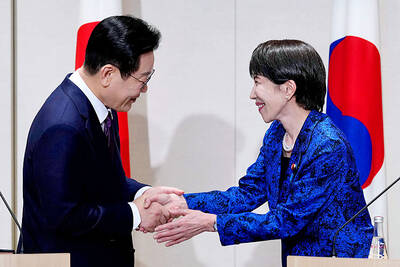Millions of students wearing masks streamed back to primary and secondary schools across the Philippines yesterday in their first in-person classes after two years of COVID-19 lockdowns that are feared to have worsened one of the world’s most alarming illiteracy rates among children.
Officials grappled with daunting problems including classroom shortages, lingering COVID-19 fears, an approaching storm and quake-damaged school buildings in the country’s north, to welcome back many of more than 27 million students who enrolled for the school year.
Only about 24,000 of the nation’s public schools, or about 46 percent, are able to open in-person classes five times a week, while the rest must resort to a mix of in-person and online classes until Nov. 2, when all public and private schools are required to bring all students back to classrooms, education officials said.

Photo: AP
About 1,000 schools are unable to shift to face-to-face classes entirely during the transition period ending on Nov. 2 for various reasons, including damage to schools wrought by a powerful earthquake last month in the north, officials said.
The Department of Education said some schools would have to divide classes in three shifts a day due to classroom shortages, a longstanding problem, and to avoid overcrowding that could turn schools into new epicenters of COVID-19 outbreaks.
“We always say that our goal is maximum of two shifts only, but there will be areas that would have to resort to three shifts because they’re really overcrowded,” Education Department spokesperson Michael Poa said on Friday at a news conference.
Despite many concerns, education officials gave assurances that it is “all-systems go” for yesterday’s resumption of classes, he said.
Philippine Senate Majority Leader Joel Villanueva said such assurances have to be matched by real improvements.
“The era of missing classrooms, sharing tables and chairs, and holding classes under the shade of trees must no longer happen,” said Villanueva, who filed two bills calling for additional grocery, transportation and medical allowances for public-school teachers.
Among the worst-hit by the COVID-19 pandemic in Southeast Asia, the Philippines under former president Rodrigo Duterte enforced one of the world’s longest lockdowns and school closures. Duterte, whose six-year term ended on June 30, had turned down calls for reopening in-person classes due to fears that it might ignite new outbreaks.
The prolonged school closures sparked fears that literacy rates among Filipino children — which were already at alarming levels before the pandemic — could worsen.
A World Bank study last year showed that about 90 percent of children in the Philippines were suffering from “learning poverty,” or the inability by age 10 to read and understand a simple story.
“Prolonged school closures, poor health risk mitigation, and household-income shocks had the biggest impact on learning poverty, resulting in many children in the Philippines failing to read and understand a simple text by age 10,” UNICEF Philippines said in a statement.
“Vulnerable children such as children with disabilities, children living in geographically isolated and disadvantaged areas, and children living in disaster and conflict zones fare far worse,” the UN agency for children said.
Poa said 325 temporary “learning spaces” were being constructed in northern Abra province and outlying regions to replace school buildings battered by a powerful July 27 quake.
Education officials also scrambled to help more than 28,000 students look for new schools after at least 425 private schools closed permanently since the pandemic’s arrival in 2020, mainly due to financial losses.

Indonesia and Malaysia have become the first countries to block Grok, the artificial intelligence (AI) chatbot developed by Elon Musk’s xAI, after authorities said it was being misused to generate sexually explicit and nonconsensual images. The moves reflect growing global concern over generative AI tools that can produce realistic images, sound and text, while existing safeguards fail to prevent their abuse. The Grok chatbot, which is accessed through Musk’s social media platform X, has been criticized for generating manipulated images, including depictions of women in bikinis or sexually explicit poses, as well as images involving children. Regulators in the two Southeast Asian

COMMUNIST ALIGNMENT: To Lam wants to combine party chief and state presidency roles, with the decision resting on the election of 200 new party delegates next week Communist Party of Vietnam General Secretary To Lam is seeking to combine his party role with the state presidency, officials said, in a move that would align Vietnam’s political structure more closely to China’s, where President Xi Jinping (習近平) heads the party and state. Next week about 1,600 delegates are to gather in Hanoi to commence a week-long communist party congress, held every five years to select new leaders and set policy goals for the single-party state. Lam, 68, bade for both top positions at a party meeting last month, seeking initial party approval ahead of the congress, three people briefed by

The Chinese Embassy in Manila yesterday said it has filed a diplomatic protest against a Philippine Coast Guard spokesman over a social media post that included cartoonish images of Chinese President Xi Jinping (習近平). Philippine Coast Guard spokesman Jay Tarriela and an embassy official had been trading barbs since last week over issues concerning the disputed South China Sea. The crucial waterway, which Beijing claims historic rights to despite an international ruling that its assertion has no legal basis, has been the site of repeated clashes between Chinese and Philippine vessels. Tarriela’s Facebook post on Wednesday included a photo of him giving a

NONCOMMITTAL: South Korea’s president said the world could only wait for China and Japan to resolve matters amicably through dialogue to secure regional peace Japanese Prime Minister Sanae Takaichi yesterday called on South Korean President Lee Jae-myung to help “ensure regional stability,” as Beijing pressures Tokyo over its stance on Taiwan. The two leaders met in Takaichi’s picturesque home region of Nara in western Japan, days after Lee visited Chinese President Xi Jinping (習近平) in Beijing. They agreed to strengthen cooperation on economic security, regional and global issues, as well as artificial intelligence, South Korea’s presidential office said. Looming in the background of the meeting was Japan’s heated diplomatic spat with China, triggered by Takaichi’s suggestion in November that Tokyo could intervene militarily if China attacks Taiwan. China